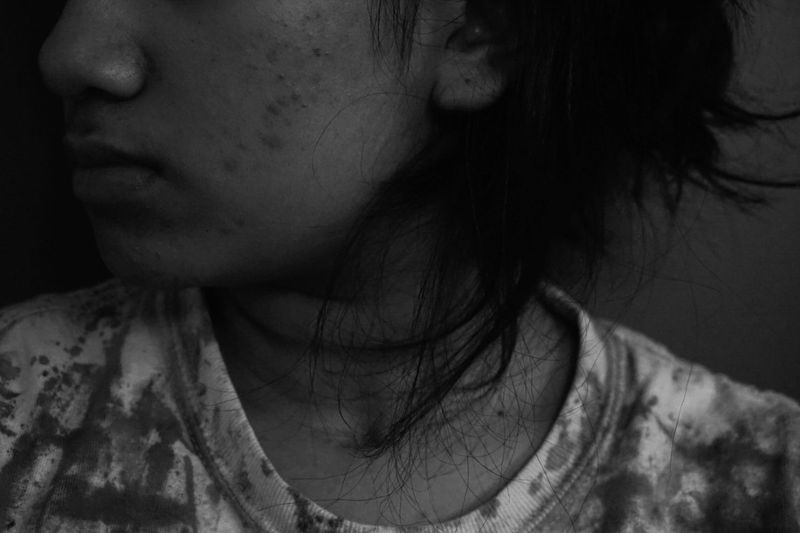We Are America
The Burden of My Skin
By Ira

North Quincy High School, Massachusetts
My appearance was never something I put too much thought into. It had not occurred to me that my appearance could mean something to other people, could possibly offend other people, or even determine my worth. I believe it was around age 11 when the thought “too dark” entered my mind. My friend’s younger brother had asked me why I was so dark and I couldn’t find an answer. The thought had never entered my mind before that and it frustrated me. Did people really think I was too dark? Was that even a thing? My lack of self-conscience at a young age saved me from falling to the deep waters of body insecurity. Except it didn’t last very long. Time went by and I started to notice myself more and more in the mirror. My skin started feeling like extra weight. I started to notice how everyone fit their skin and how it suited them, unlike mine.
This insecurity became worse when I started to use social media. Colorism was prevalent in my country, Bangladesh, and though my mother had done her best to shield me from the toxic aspects of my culture, it wasn’t enough. I began to see it everywhere; my aunts using bleaching skin creams; bleaching creams promoted by models: colorism not only in my own country, but in the entirety of Asian and Western culture. The glorification of bleaching creams made me feel like my skin was something that needed to be cleansed, like dirt. In pictures, I started using lightening filters, I used my mom’s foundation because it was lighter than mine: I started throwing parts of myself away to feel a little prettier, even if it was a delusion. I was falling apart trying to “look a little better”. It was suffocating, to see it everywhere but have it be denied by people who already fit the beauty standard.
My mom grew up within this toxic culture; her relatives had always mocked the color of her skin. It was “too murky” and “darker than her cousins” and “didn’t suit nice clothes”. I believe one of the main reasons she brought me to the US was to save me from those standards. But it isn’t so easily avoidable. I believe it’s also why it's so hard for her to understand why I could possibly have the same insecurities since she had worked so hard to escape those societal standards. My skin, along with many other insecurities, plagued my head for the majority of my middle school years.
It became hard for me to look in the mirror and at one point, I stopped taking photos all together. I’d hide as much as I could in photos or cover as much as I could. Never had I felt so ugly before; I just couldn’t understand how everyone else seemed so beautiful and well suited in their skin. It frustrated me even more so that my mom didn’t understand what I was going through. I was younger and didn’t realize my mom’s perspective and obviously blamed her for anything I couldn’t fix myself. Another toxic aspect of my culture was the blatant disregard for mental health; it was seen as boredom and attention seeking. My mom had grown up under this mindset and didn’t get how I could be so upset over “trivial things”. I was angry at myself for being so ugly, angry at my mom for not getting it, and angry at the world for being so selective. I had no one to talk to, no one to ask for help, and I felt so alone.
It now occurs to me once in a while that people get ‘different’ and ‘bad’ mixed up. Differences aren't bad but people associate unfamiliarity with something negative and move on. To be a victim of that mindset can be excruciating, but it's possible to escape it. I’m slowly learning to live for myself and no one else. And my mom, as strict as she may be, taught me this in many ways. Her resilience against the odds of everything she’s faced has shown me that it's possible to overcome any struggle that comes your way. I’d thrown my life away to something society created and I’m trying to get it back. The shift is gradual, to go from years of hating my own skin to the point of trying to bleach it, to finding it unique and loving it is a long process. I’ve ditched the whitewashing filters and apps. I still consider the mirror an enemy but we’ve gotten closer; hopefully we can resolve our differences soon.
© Ira. All rights reserved. If you are interested in quoting this story, contact the national team and we can put you in touch with the author’s teacher.